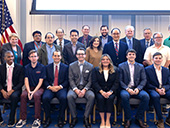An Attitude of Educational Leadership
This article is over six months old and may reference former titles for DBU faculty or staff, discontinued programs, or other details that have since changed. If you have any questions, please contact us at news@dbu.edu, or (214) 333-5172.

DBU alumnus Dr. Dionel Waters is known for a great length of educational achievements that have led and prepared him for his current role today as a principal in Arlington, Texas.
After graduating from high school, Waters went on to earn a Bachelor’s in Elementary Education/Child Development, a Master’s of Art in Curriculum & Teaching, a dual master’s degree in Educational Leadership & Business Administration (MBA), and a Ph.D. in K-16 Educational Leadership & Policy Studies. He is also a published author. His book, titled Preparing For and Surviving the First 90-Days of Principalship, is the product of his love for the job and preparing aspiring individuals to step into the occupation.
Throughout his career, Waters has taught in several different states, as well as in Australia. After his fifth year of teaching, he made the decision to become a principal.
“When I came back from Australia, my wife encouraged me to go into administration where I would be able to help more teachers and students achieve academic success,” Waters explained. “I received my formal principal certification training from DBU, which I loved because I was educated by current principals who were able to connect theory with practice. As a result, I have had the privilege of leading schools at both elementary and secondary levels, in addition to teaching at the collegiate level as an adjunct professor of education.”
For Waters, a Christ-centered education recognizes the responsibility for taking education and using it to serve others in such a way that exudes servant leadership. He attests that the best part of working in the public education system is being in a position to serve others, especially children.
“I am a firm believer that to whom much is given, much is required,” Waters explained. “I hold myself accountable for doing all that I can do to help our world through education, while utilizing my gifts to ultimately give the glory to God in the end. My favorite thing about being a part of the public education system, in light of the Gospel, is knowing that I have been placed here to serve others, especially children. One of my favorite scriptures is Proverbs 22:6 ‘Train up a child in the way he should go: and when he is old, he will not depart from it’ (KJV). The Christ-like attitude of having a servant’s heart in education was one of the main things that attracted me to DBU. As a result, I have taken that same mindset into my work each day while asking myself ‘who among us was voiceless yesterday that needs MY voice today?’”
In the public education system, there are a variety of ways one can exhibit an attitude of servanthood. Waters, someone who has had the opportunity to work as a principal of Title 1 schools at both elementary and secondary levels, states that serving students in need is a personal honor.
“Many of my students come to school each day with the burden of getting their basic necessities met, in light of their daily academic pressures,” Waters shared. “As principal, it is my responsibility to create an environment where they feel safe and academically successful. I look forward to providing that ‘safe haven’ for all of my students, despite the personal struggles they may endure outside of our school.”
Waters explains that his personal philosophy of education is rooted in the belief that educators must first direct their attention to how their students learn, so as to best provide education in a way that is coherent for the child and in a way that attends to their equitable needs. He credits this as a method that will allow students to be successful in their academic endeavors.
“Once our focus is on the ways in which our students learn, we can now provide good first instruction, culturally relevant instruction, differentiated instruction, data-driven instruction, etc.,” Waters stated. “In order for any of this to take place, we must also keep in mind the importance of relationships. My favorite saying is ‘you may be one person to the world; but you may be the world to one person!’ That is the main reason why I love to focus on the question, ‘how do my students learn,’ because it requires having a relationship with your students in order for you to determine their learning styles and the best instructional strategies to use.”
Waters' outlook and vision for educational leadership encompasses the idea that behind teachers, principals are the second leading factor in impacting academic success.
“Research informs us that the principal is the second leading factor outside of the classroom teacher when it comes to student academic success,” Waters explains. “This is the main reason why I decided to focus my doctoral dissertation on first-year principals and the type of coaching and/or mentoring support they received during their transition into the principalship. If I was given the opportunity to share a piece of advice for educational lawmakers and school districts, it would be to consider providing principals with coaching and mentoring support in order for them to better assist their teachers, which will ultimately impact student-learning outcomes.”
To those serving or aspiring to serve in the educational system, Waters advises a focus on the relational aspect of education, especially within the environmental context of the world we live in today.
“I would challenge and encourage those who are currently working in education and those aspiring to do so, to focus on ways to build relationships with their students,” Waters encouraged. “We are living in a society where negativity, via social media, is more prominent today in comparison to previous years. Students are struggling with so much these days.”
Faith Myers was a member of University Communications at Dallas Baptist University.








